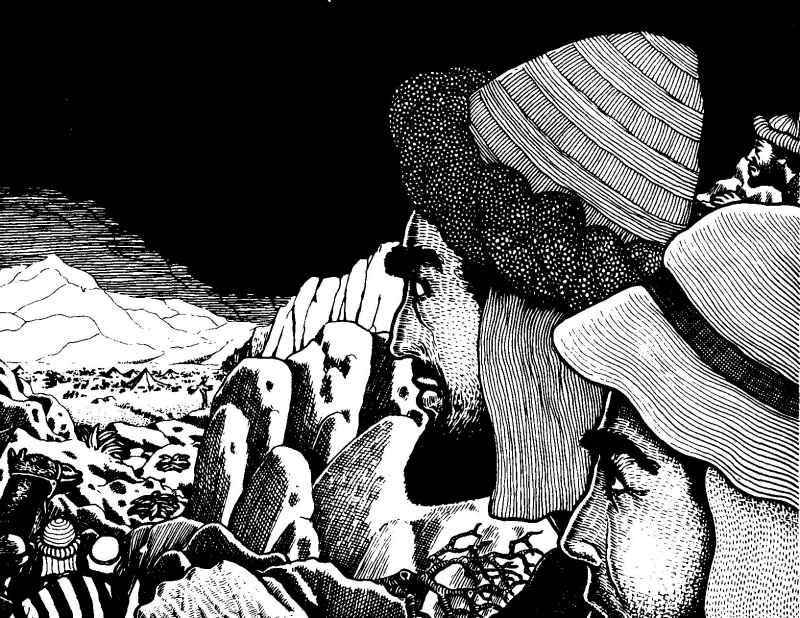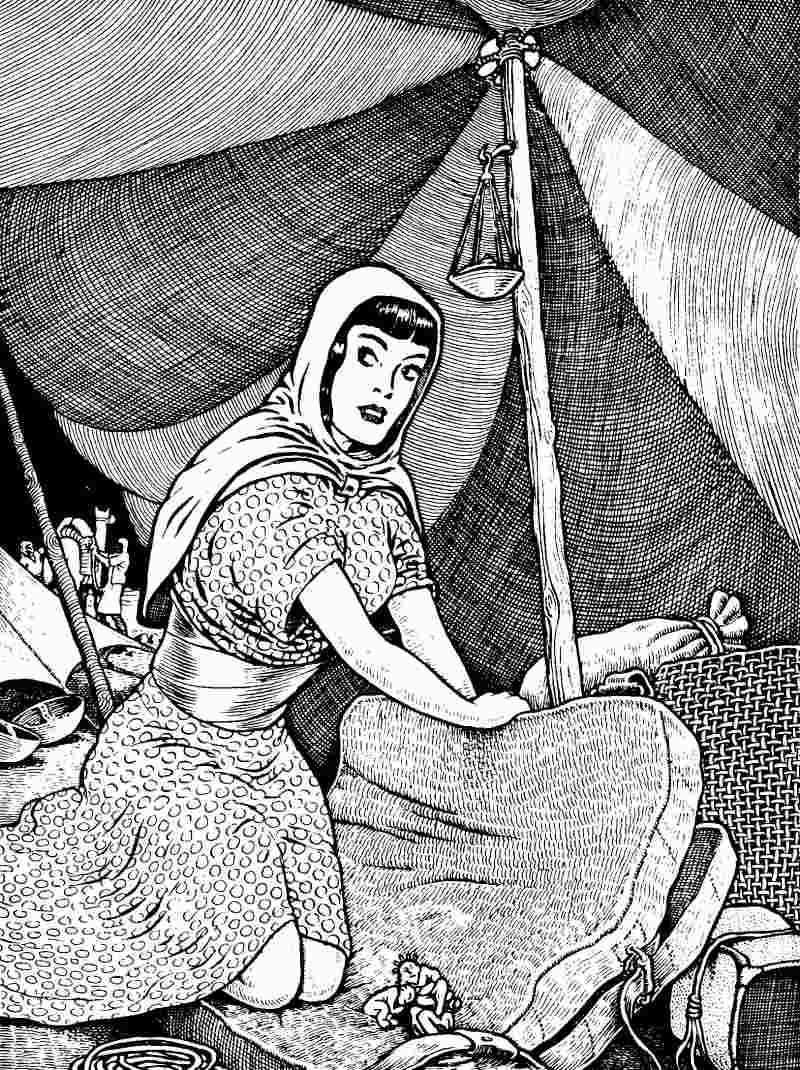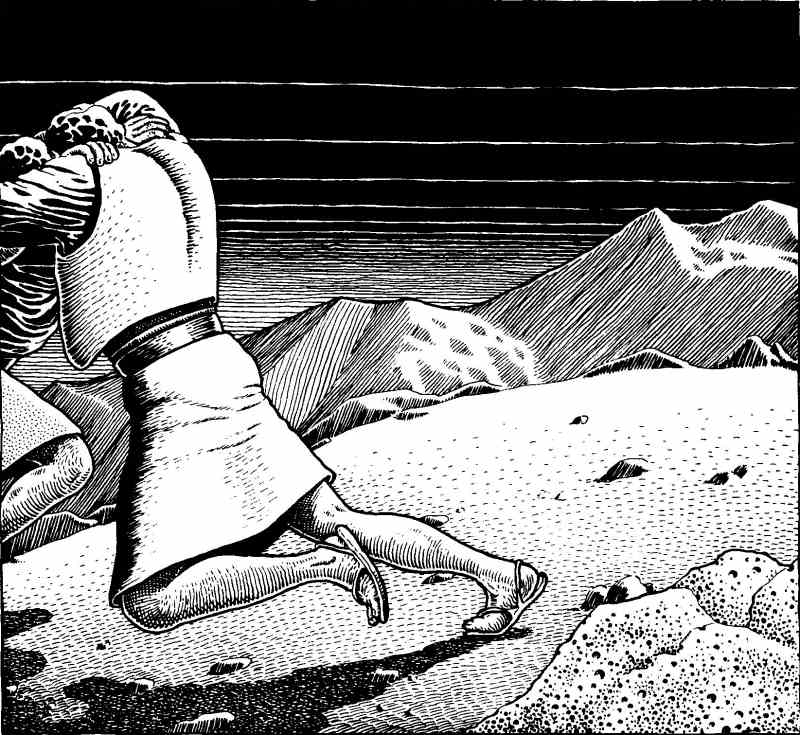Jacob Leaves Laban Secretly
As Laban became less friendly, Jacob's desire to leave grew. One day God made it plain to Jacob that he should go back to Canaan. (Gen. 31:13) Fearing that Laban might forcibly try to prevent his leaving, Jacob waited until a time when his father-in-law had gone several miles away to oversee the shearing of his sheep. Then Jacob had his workmen take down his tents and pack them and his belongings on his camels and burros. Jacob was careful not to take anything that belonged to Laban. With all his family, flocks and herds, it was a big moving job. Cattle, sheep and goats had to be herded. The caravan couldn't move very fast. (Verses 17-18)
Leah and Rachel were glad of the chance to leave. They felt that their father hadn't been fair to them or to Jacob.
Laban didn't find out what had happened until the caravan had been gone for three days. (Verse 22) Of course he was very angry. His anger was even greater when he found that some small idols he prized highly, and which Rachel had stolen, were missing. He was certain that Jacob had taken them.
"Saddle my fastest camels for a trip to the west!" Laban roared at his foreman. "I will overtake Jacob if we have to go all the way to Canaan!"
After seven days of hard travel, during which the camels were forced to move at top speed, Laban and his men came within sight of Jacob's caravan encamped for the night beside the main east-west trail. (Verse 23)
"We'll stay back here tonight out of their sight," Laban told his men. "Early tomorrow morning we'll overtake them. Then Jacob will regret leaving me as he did!"
By next morning, however, Laban wasn't very intent on revenge. That night God spoke to him in a dream (verse 24) warning him that if he harmed Jacob, God would deal with him harshly. Laban was so disturbed by the dream that he dared not carry out his intent to cause Jacob any trouble. By the time his caravan overtook Jacob's, his anger had subsided.
"Why did you sneak away as you did?" he demanded of Jacob. "If you had told me, I would have prepared a great feast. I didn't even get to tell my daughters and grandchildren goodbye." (Verses 25-29)
"I left while you were away so that there wouldn't be any arguments," Jacob answered.
"I would more than argue with you," Laban said, "if God hadn't warned me in a dream last night not to oppose you."
"You're wise to obey that warning," Jacob said.
"Probably so," Laban agreed. "I respect your belief, but you obviously don't respect mine. Otherwise you wouldn't have taken my little idols. I demand them back!"
|
After a week of hard, fast travel on camels,
Laban and his men came within sight of Jacob's caravan camped for the night.
 |
"If you think I have them, search my belongings," Jacob replied." If you find them with the property of any person in this caravan, let that person die!"

Rachel went to her tent and hid her father's little idols under a camel saddle.
|
Jacob didn't know that Rachel had the images, or he wouldn't have made such a promise. While Laban and his men searched for the images, Rachel rested in her tent on a camel saddle in which she had hidden the idols. Soon the search brought Laban to Rachel's tent.
"Get up from that saddle so that I may search there," he gruffly muttered to his daughter.
Rachel stopped further inspection of her things by telling Laban that she didn't feel well and didn't want to be disturbed. Laban irritably left to go tell Jacob that the images couldn't be found. Jacob was angry because of the search. He asked Laban why Laban had been unfair to him through twenty years of devoted service, and why he now treated him as an enemy.
Laban knew that Jacob deserved better treatment. Because he wanted the reputation of a fair man, Laban suggested that they make an agreement that there wouldn't be any more unfriendliness toward each other. As a monument to this agreement, they had their men erect a large pile of stones where they were. Then they dined together as a further sign of friendship.
Next morning Laban said goodbye to his daughters and their children, and set back toward Haran. (Gen. 31:35) Jacob's caravan moved on westward.
Jacob Tested by God
The closer Jacob moved to Canaan, the more concerned he became about meeting his brother, Esau. For a long time Esau had lived in the rough, wild country of Seir, through which Jacob's caravan would almost travel on the way to Canaan. Jacob feared that there would be trouble if Esau heard that he was coming that way. Jacob was certain that Esau hadn't forgotten how he had been tricked many years previously. Esau had threatened to kill Jacob, and it could be that he was still awaiting Jacob's return.
In an attempt to find out how Esau felt about him, Jacob sent messengers ahead to try to contact his brother. They were instructed to tell him that Jacob was about to pass through the land with much wealth from Haran, and that Jacob hoped they could meet as friends.
Not long afterward the messengers returned to report that they had met Esau, and that he was not far behind them with four hundred men! (Gen. 32:3-6)
The report shocked Jacob. He knew that all the people in his caravan couldn't stand against four hundred men led by a man who had promised to kill him. He gave orders for the caravan to divide into two groups and to separate. He reasoned that if one group suffered an attack by Esau's men, the other group might escape. (Verses 7 and 8)
Jacob then did the thing that would be more helpful to him than anything else he could do. He asked for God's protection. He admitted to God that he wasn't worthy of it, at the same time reminding God, though that wasn't necessary, that God had promised him protection.
God wants us to look to Him for Him for help, but if there is anything we can do to help or protect ourselves, He expects us to do it instead of being lazy. Jacob didn't stand idly by and wait for his Creator to do what man could do. Probably God inspired him to act as he did. Out of his animals he picked five hundred and fifty of the choicest cattle, goats, sheep, burros and camels. Then he divided each kind of stock into groups, and each group was sent out at a different time to approach Esau as one of several gifts.

Jacob put all his strength into the all-night struggle with the Messenger from Heaven.
|
"Tell my brother that I hope he will accept my presents," Jacob instructed the men who departed with the stock in the direction from which Esau had been reported to be approaching. (Verses 13-21)
Thus Jacob hoped to make Esau feel friendly toward him. After the animals intended for Esau had gone on, Jacob moved the two sections of his caravan on ahead a short distance to camp for the night. (Verses 22 and 23) He remained behind to be alone and pray.
That night a strange thing happened. Suddenly somebody seized him and held him down as though trying to prevent his completing his trip to Canaan. Before long Jacob and his attacker were engaged in a furious wrestling match! Soon Jacob realized that his opponent wasn't an ordinary man. Instead, he was an angel sent from God. (Verses 24-25) Years later the prophet Hosea was inspired to write that the angel with whom Jacob wrestled was actually the One who later became Jesus! (Hosea 12:3-5)
That was a trying night for Jacob. When he realized that he was dealing with more than a human being, he struggled to be able to get the blessing of this Superior Entity. (Verse 26) Before dawn, Jacob was blessed and praised for determination greater than that of his brother Esau. Jacob was determined to strive with all his might to not lose God's blessings and eternal promises. He proved by his physical wrestling that he had the strength of character to overcome his spiritual problems. The wrestling match was a test of character!
Before Jacob's wrestling partner left, he informed Jacob that his name should be changed from Jacob to Israel, which meant one who overcomes, or proves to be a champion. (Verse 28) God wouldn't give His blessing and a birthright to a man who had taken them from a weaker brother unfairly. Therefore He appeared as a man to give Jacob the chance to prove himself with one who appeared as his equal.
When dawn came, Jacob found that he was very sore in one hip, showing that God's blessings don't come without hardship and suffering. (Verse 31)
Later, when he joined his caravan, he was troubled to see a growing cloud of dust in the distance. There was no doubt that it was Esau and his four hundred men swiftly riding toward Jacob's caravan.